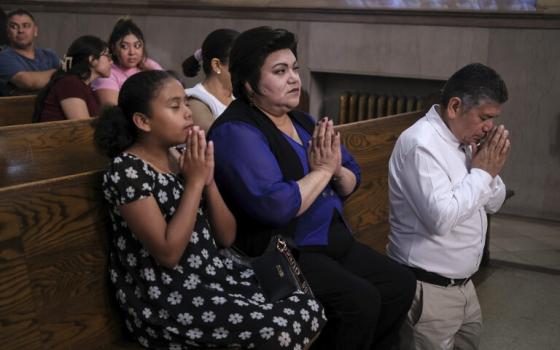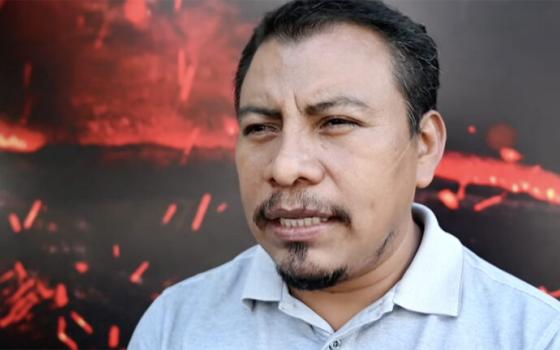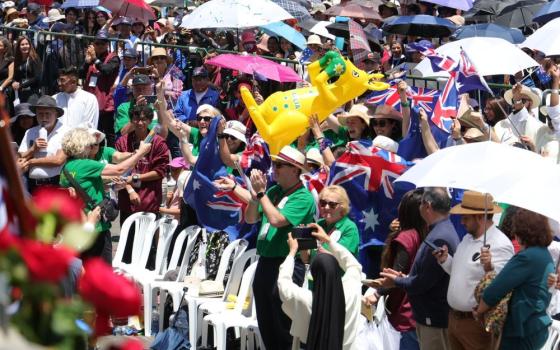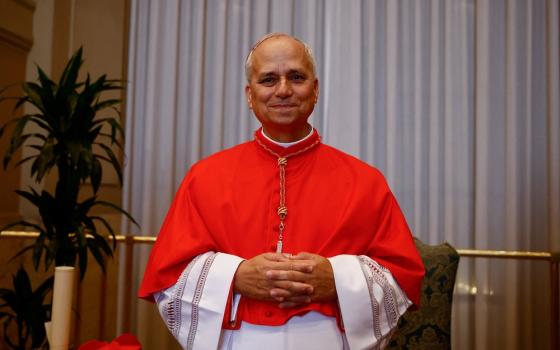Bill Veeck, the P.T. Barnum of sports franchise owners, once said there are only two seasons -- winter and baseball. I’m a convinced Veeckian on that score, so I tend to seek diversions to occupy the long emptiness until Opening Day. One thought exercise I’ve come up with is this: Sit down and try to compile a list of the ten most consequential Catholic bishops in America. By that, I don’t mean the bishops you like most or agree with, but those who seem to have the most impact.
Part of the fun, of course, is that a bishop can be “consequential” in very different ways.
Cardinal Justin Rigali of Philadelphia, for example, would probably make the list because of his behind-the-scenes muscle -- seeing his protégés named bishops and steering matters through the shoals of Rome. Bishop Gerald Kicanas of Tucson might be included for his ability to forge consensus and get things done within the U.S. bishops’ conference. Archbishop Jose Gomez of San Antonio and Bishop Jaime Soto of Sacramento might make the cut because of their leadership among the exploding sector of Hispanic Catholics, while Cardinal Francis George of Chicago would be in the mix as an intellectual point of reference.
To call these prelates “consequential” is not necessarily to endorse everything they represent. It’s rather to acknowledge that they matter.
 That, in turn, brings us to Archbishop Charles Chaput of Denver, who illustrates yet another way a bishop can matter: As an evangelist, an opinion-maker, a writer and speaker. Usually seen as a strong conservative, Chaput can be polarizing because he takes clear positions and defends them with relish. He’s consequential in somewhat the same way as politicians and pundits with bold views and the nerve not to pull their rhetorical punches: Love ‘em or hate ‘em, they’re hard to ignore.
That, in turn, brings us to Archbishop Charles Chaput of Denver, who illustrates yet another way a bishop can matter: As an evangelist, an opinion-maker, a writer and speaker. Usually seen as a strong conservative, Chaput can be polarizing because he takes clear positions and defends them with relish. He’s consequential in somewhat the same way as politicians and pundits with bold views and the nerve not to pull their rhetorical punches: Love ‘em or hate ‘em, they’re hard to ignore.
Sometimes accused of being a traditionalist, Chaput is actually a very 21st century bishop in at least one sense: Whatever national influence he wields has almost nothing to do with formal ecclesiastical power. He doesn’t hold office in the bishops’ conference, and certainly can’t compete with Rigali as a Roman heavyweight. I mean no disrespect to Denver, especially since my wife and I now live there, but the mere fact of being the Archbishop of the Rockies is hardly sufficient to leave many people outside the Mountain Time Zone with bated breath awaiting his latest pronouncement.
In an era in which institutional authority of all sorts has collapsed, a religious leader who wants to move opinion has to compete in a secular marketplace of ideas. Chaput does, rarely invoking “because the church says so” as an argument. In a brief talk recently on Catholic education, for instance, he never cited Ex Corde Ecclesiae, but rather Francis Fukuyama, Bill Joy and Neil Postman, with Augustine thrown in for good measure. He called on Catholic universities to beef up their religious identity, not because the pope decreed it, but because a society of great technological prowess and a weak moral compass needs it.
If you want a sound-bite to sum up Chaput’s message, here’s a recent epigram: “There’s no more room in American life for easy or tepid faith.” Like all such formulae, it’s an invitation to debate: What exactly does that mean?
Earlier this week in Houston, Chaput tried to answer that question with speeches on three hot-button themes: health care reform and the future of Catholic health care; Catholic higher education; and the role of Christians in American public life. The last address was delivered at Houston Baptist University, while the other two came at the University of St. Thomas. His arguments are strong medicine, likely to provoke widely varying reactions, but it would be a mistake to underestimate their importance in shaping some sectors of Catholic opinion as well as outsider impressions of the church.
The following are excerpts from those speeches. Full texts of the speeches on health care and on politics may be found here: http://www.archden.org/index.cfm/ID/278/Addresses/
* * *
On Christians in Public Life:
One of the ironies in my talk tonight is this. I’m a Catholic bishop, speaking at a Baptist university in America’s Protestant heartland. But I’ve been welcomed with more warmth and friendship than I might find at a number of Catholic venues. This is a fact worth discussing. I'll come back to it at the end ...
I’m here as a Catholic Christian and an American citizen -- in that order. Both of these identities are important. They don’t need to conflict. They are not, however, the same thing. ... No nation, not even the one I love, has a right to my allegiance, or my silence, in matters that belong to God or that undermine the dignity of the human persons He created.
Fifty years ago this fall, in September 1960, Sen. John F. Kennedy, the Democratic candidate for president, spoke to the Greater Houston Ministerial Association. ... His speech left a lasting mark on American politics. It was sincere, compelling, articulate -- and wrong. Not wrong about the patriotism of Catholics, but wrong about American history and very wrong about the role of religious faith in our nation’s life. And he wasn’t merely “wrong.” His Houston remarks profoundly undermined the place not just of Catholics, but of all religious believers, in America’s public life and political conversation. Today, half a century later, we’re paying for the damage.
[Kennedy’s speech] has at least two big flaws. The first is political and historical, the second is religious.
Early in his remarks, Kennedy said: “I believe in an America where the separation of Church and state is absolute.” The trouble is, the Constitution doesn’t say that. The Founders and Framers didn’t believe that. And the history of the United States contradicts that. ... America’s Founders encouraged mutual support between religion and government.
The Houston remarks also created a religious problem. ... Fifty years after Kennedy’s speech, we have more Catholics in national public office than ever before. But I wonder if we’ve ever had fewer of them who can coherently explain how their faith informs their work, or who even feel obligated to try. The life of our country is no more “Catholic” or “Christian” than it was 100 years ago. In fact it’s arguably less so. And at least one of the reasons for it is this: Too many Catholics confuse their personal opinions with a real Christian conscience. Too many live their faith as if it were a private idiosyncrasy -- the kind that they’ll never allow to become a public nuisance. And too many just don’t really believe. Maybe it’s different in Protestant circles. But I hope you’ll forgive me if I say, “I doubt it.”
As I was preparing these comments for tonight, I listed all the urgent issues that demand our attention as believers: abortion; immigration; our obligations to the poor, the elderly and the disabled; questions of war and peace; our national confusion about sexual identity and human nature, and the attacks on marriage and family life that flow from this confusion; the growing disconnection of our science and technology from real moral reflection; the erosion of freedom of conscience in our national health-care debates; the content and quality of the schools that form our children.
I believe abortion is the foundational human rights issue of our lifetime. We need to do everything we can to support women in their pregnancies and to end the legal killing of unborn children. We may want to remember that the Romans had a visceral hatred for Carthage not because Carthage was a commercial rival, or because its people had a different language and customs. The Romans hated Carthage above all because its people sacrificed their infants to Ba’al. For the Romans, who themselves were a hard people, that was a unique kind of wickedness and barbarism. As a nation, we might profitably ask ourselves whom and what we’ve really been worshipping in our 40 million “legal” abortions since 1973.
The vocation of Christians in American public life does not have a Baptist or Catholic or Greek Orthodox or any other brand-specific label. ... We live in a country that was once -- despite its sins and flaws -- deeply shaped by Christian faith. It can be so again. But we will do that together, or we won’t do it at all.
* * *
On Health Care Reform and Catholic Health Care:
We live in a time when [two] simple words -- “human” and “person” -- have disputed meanings, and the idea of the “sanctity” of human life is sometimes seen as little more than romantic poetry. This cultural confusion, fueled by trends in our science and technology, is magnified in the current debates over health-care reform.
Already in a number of states, the Church has faced government attempts to press Catholic hospitals, clinics and other social service institutions into violating their religious principles. In Colorado, lawmakers recently tried to block the sale of two local hospitals to a large Catholic hospital system unless the Catholic system agreed to arrange for abortions, sterilizations, and other so-called women’s services. This was a fairly bald attempt at bullying, and it failed. ... In a nation built largely by people of faith, with a long history of religious liberty, this is a battle Catholics should never have been forced to fight.
How does all this relate to health-care reform and the future of the Catholic health-care ministry? I’ll answer with a few simple facts.
- First, while access to decent health care may not seem like a “right” in the same sense as our rights to life, liberty and the pursuit of happiness, the church does see it as a right.
- Second, a government role in ensuring basic health care for all citizens and immigrants can be very legitimate and even required.
- Third, the principle of subsidiarity reminds us that problems should be solved as locally as possible.
- Fourth, no national health-care plan can be morally legitimate if it allows, even indirectly, for the killing of the unborn, or discriminatory policies and pressures against the elderly, the infirm and the disabled. Protecting the unborn child and serving the poor are not unrelated issues. They flow from exactly the same Christian duty to work for social justice.
- Fifth, health-care reform proposals with any hope of advancing remain fatally flawed on the abortion issue, conscience protections and the inclusion of immigrants. But the even harsher reality is this: Whether we get good health-care reform or not, legislative and judicial attacks on Catholic health care will not go away, and could easily get worse.
We need to examine our hearts with real candor. And we need to ask ourselves how “Catholic” we really want to be. If the answer is “pretty much” or “sort of” or “on my own terms” -- then we need to stop fooling ourselves, for our own sake and for the sake of the people around us who really do believe. There’s no more room in American life for easy or tepid faith.
If you’re a doctor or ethicist or hospital administrator or system executive working in Catholic health care, and in good conscience you cannot support Catholic teaching or cannot apply it with an honest will -- then you need to follow your conscience. The Church respects that. ... But conscience, as Newman once said, has rights because it has duties. One of those duties is honesty. It may be time to ask whether a different place to live your vocation, outside Catholic health care, is also the more honest place for your personal convictions. What really can’t work is staying within Catholic health care and not respecting its religious and moral principles with all your skill, and all your heart.
You and I and all of us -- we’re disciples first.
* * *
On Catholic Higher Education:
As a nation, we’ve created a culture that behaves like the Sorcerer’s Apprentice. Neil Postman once called us the world’s first emerging “technopoly” -- a society where the real organizing principle is technological progress in its narrowest sense, and every other social value is subordinated to it. We have the knowledge to unlock the power of creation, but we lack the wisdom and the humility to use it for real human progress. Our definition of “progress” is limited and confused. It ignores the most vital part of what it means to be really “human”: our spirit. Many of us no longer really believe that a unique and permanent “human nature” exists.
This is why, when Catholic institutions of higher learning soften or dilute their bonds to the Church, or treat Catholic teaching as somehow separate from serious intellectual life, they’re not becoming more progressive or more relevant. They’re choosing to be irrelevant because they have nothing new and confident to say to the world around them. They’re betraying themselves, their students and the culture that Jesus Christ calls them to sanctify.
Be Catholic, really, faithfully, unapologetically Catholic, and the future will have the kind of articulate and morally mature leaders it needs.
[John Allen is NCR senior correspondent. His e-mail address is jallen@ncronline.org.]




